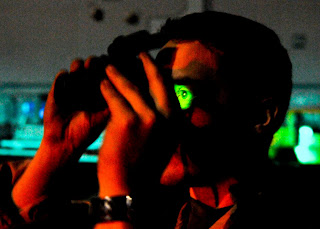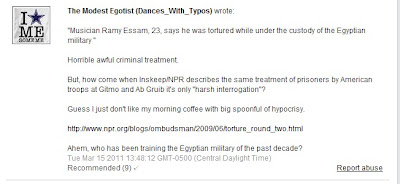
NPR related comments are always welcomed...play ball!


Wertheimer: "How seriously do we take the reports that he is a very conservative person, that he is an Islamist,...?
Powell: "Well, you can bet that the U.S. State Department's alarmed...He has a history that goes back to the 1980s. He used to recruit Islamist fighters to fight against the Soviet Union in Afghanistan, the mujahideen, and most vividly to fight with Osama bin Laden. And more recently there has been accusations that he has been recruiting al-Qaida to fight against the Shia in the north of the country."

"Does a pilot who is flying over Libya today have a very different and clearer sense of what his targets are than a pilot who was flying over, say, the Balkans back in the early '90s?"
-or-
"Is the result of all this that when a plane goes out and it's hoping to hit a tank on a highway, that the odds of hitting the gas station alongside the highway are far, far, far less than they might have been, say, 15 or 20 years ago."
"Absolutely. We had pretty good precision 20 years, 15 years ago. We have much better precision now. But at the end of the day, something can occur, for instance, you know, during the Serbian fight there was a situation where an individual was getting ready to drop a bomb on a bridge and he noticed that there was a train coming for that bridge. And so, he had to steer the weapon away at the last minute. That was a decision that the pilots made. If he hadn't have seen that, then something bad could have happened."
"If anyone thinks that people here are happy over the drone strikes, they are foolish....In fact, the drones are fomenting hatred against the government and turning the people against America. We are killed by drones and then labeled as terrorists."
"An attack last week reportedly killed at least 40 people. Some WERE militants but most are DESCRIBED as tribal elders." [No mention of where the confirmation of "militants" came from or why those other dozens are only "described" as elders.]From this modest beginning, Julie McCarthy goes full-in:
"The U.S. has been conducting a covert program using unmanned drones to target militants in Pakistan since 2004. According to the Long War Journal, an authoritative website, the large majority of the 2,000 killed since 2006 were from the Taliban, al-Qaida and affiliated groups."
"Our Leadership Council of Distinguished Advisors includes former FBI Director Louis J. Freeh, former House Speaker Newt Gingrich, former State Department Under Secretary Paula Dobriansky, Forbes CEO Steve Forbes, former National Security Advisor Robert “Bud” McFarlane, former Ambassador Max Kampelman, Weekly Standard Editor William Kristol, Sen. Joe Lieberman (ID-CT), and former CIA Director R. James Woolsey."No surprise then that the LWJ's snappy charts claim - absent of any hard evidence - that in 2010, US airstrikes killed 801 Taliban/al-Qaeda operatives and only 14 civilians. In all the searching I've done it is clear that hard evidence is extremely difficult to come by - and that estimated of rates of civilian casualties in US drone strikes range from very high (over 90%) to high (about 30%) to low (3.5% ) to the LWJ's very low 1.7%! Given that the US and Pakistani governments have every reason to low-ball civilian casualties - and given that the US military always denies civilian casualties unless confronted by hard evidence - only a propagandist for the US military would claim a source for the lowest number as "authoritative."


"But, how come when Inskeep/NPR describes the same treatment of prisoners by American troops at Gitmo and Ab Gruib it's only "harsh interrogation"?
Guess I just don't like my morning coffee with big spoonful of hypocrisy.
http://www.npr.org/blogs/ombudsman/2009/06/torture_round_two.html
Ahem, who has been training the Egyptian military of the past decade?

"As for the 'Modest Egotist' question about why we don't refer to torture by Americans as torture. Actually, we do, and I have. Not room enough for all the links here, but many examples are searchable at npr.org at any time. Thanks again, Steve."
Inskeep: "...this is a man [Khalid Sheikh Mohammed] who was waterboarded 183 times. What difficulties are raised by bringing in a man to a civilian court when some of the evidence against him would appear to have been obtained by torture?"
Temple-Raston: "...No, you are exactly right. And this is one of the really big issues here, although in the case of Khalid Sheikh Mohammed, he actually admitted, before being tortured, that he was the mastermind of the 9/11 attacks. So that makes him slightly different than some of these other detainees who have been tortured, who maybe only admitted to something after they were subjected to enhanced interrogation techniques, or torture."

"NPR is a legitimate, independent news organization that is consistently strong and tough in its reporting."Gad! I hope he'll send me a link to that alternate universe NPR so I can listen to some of that "strong and tough" reporting.
"superb news division"and to see them close their defense with this painfully ironic warning
"But for all its flaws, consider an America without public media. Consider a society where the distortions and dissembling would go unchallenged, where fact-based reporting is eliminated."And where, pray tell, on NPR are those distortions and dissembling being challenged? And where is all that fact-based reporting? If you find it on any of the NPR flagship news shows - Morning Edition, All Things Considered, and the Weekend Editions - please write to me and I'll post them here on NPR Check.
"The range of breaking stories has gained Al-Jazeera an unprecedented number of new fans in the U.S., and more powerful enemies in the Middle East."A little later in the story, Amos - providing no details or explanation - notes that,
"Al-Jazeera Arabic has been controversial since broadcasts began 15 years ago."The focus of Amos' piece is on the current hostile reaction of authoritarian Middle Eastern regimes to the informative news that Al-Jazeera produces, but there is an odd and glaring lack of context to the report. Except for this one brief mention regarding Al-Jazeera English - " It was shut out of the American market by reluctant cable operators after the Bush administration labeled the network anti-American" - listeners would never know that Middle East dictators attacking Al-Jazeera are simply following the same playbook used by US during the past "controversial" decade. The tactics of the US playbook against Al-Jazeera range from mild to very extreme:
"Al-Jazeera's office was closed and burned, journalists beaten and detained, tapes confiscated or destroyed."She is talking about recent events in Egypt - not Iraq or Afghanistan.

"Erekat says he resigned in disgrace, because of leaks someone in his own office provided to Al-Jazeera, the popular Arabic satellite news channel. Thousands of documents - nicknamed the Palileaks - revealed much about the peace talks over the last decade."
